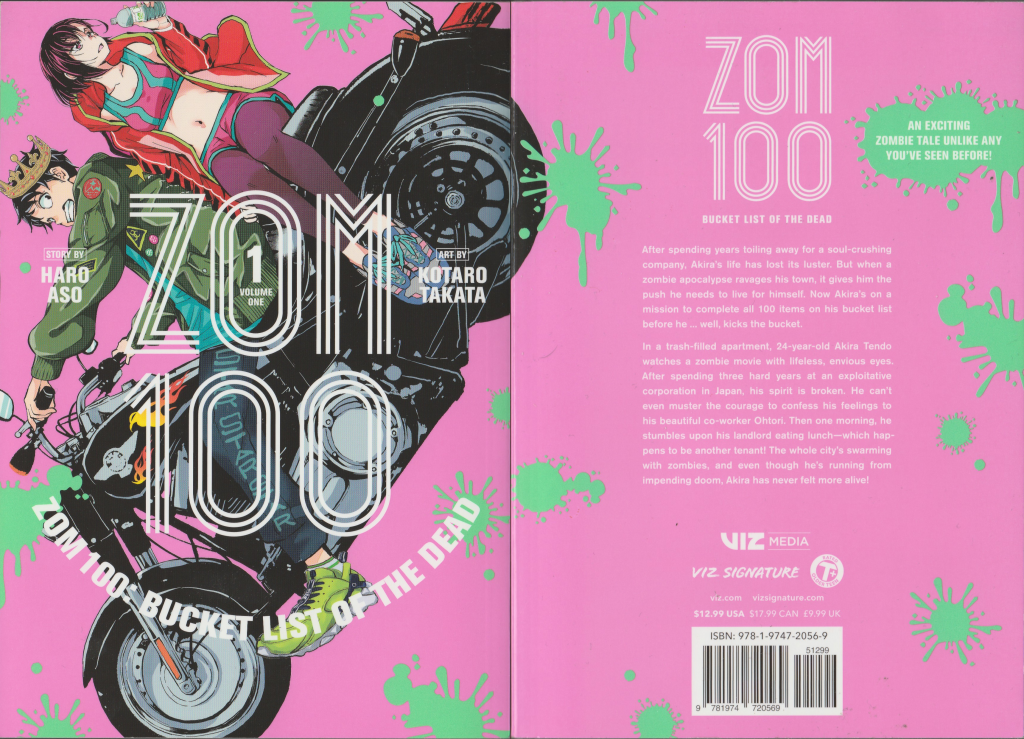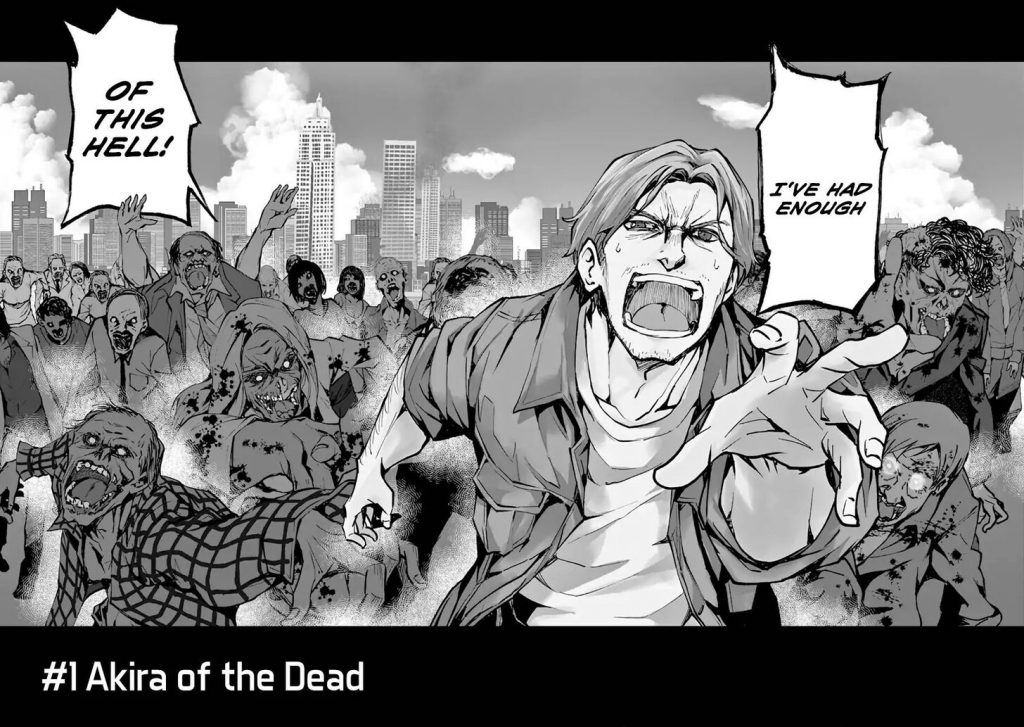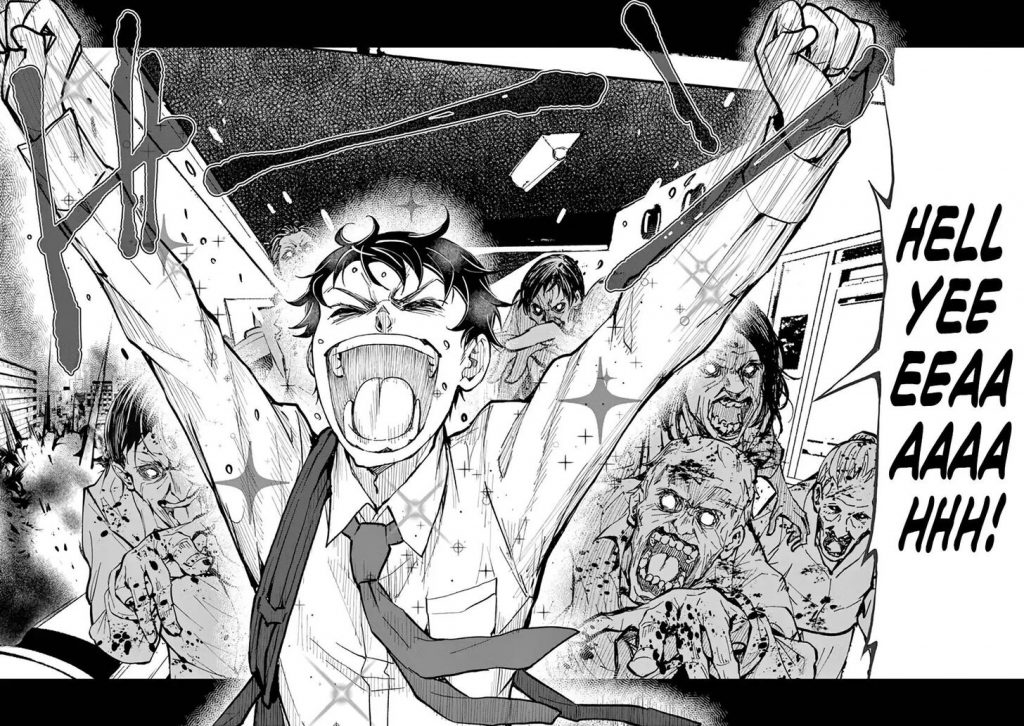





****
Zom 100: Bucket List of the Dead (Zom 100: Zombie ni Naru made ni Shitai 100 no Koto), or Zom 100, is a Horror Comedy Seinen Manga by Haro Aso and Kotaro Takata. It has been serialized in Shogakukan’s Sunday Gene-X magazine since October 2018 and presently has 7 volumes available. Viz media has licensed it for western release with the first volume having been released in February and two more slated for release within the next few months.

Zom 100 – Whew, lawd. If there ever was a title for the ages, this would be it. It’s the perfect title for this series, not just because it’s a spot on summation of the lynch pin of the plot, but also because of the juxtaposition of it all. Society ending apocalypses are supposed to be scary, heralding times. Hardly the time for leisurely activities like a bucket list. However, that’s not how Zom 100 rolls. The underlying theme of the series, so far, is learning how to live amidst a backdrop of death. Haro Aso & Kotaro Takata – Even if the name doesn’t ring a bell immediately, you’ve likely seen a couple of their older works. Namely, Hyde & Closer, or more recently, Alice in Borderland or one of its several spin offs. While Haro Aso handled both story and art on those projects, they’re credited only for story here. This time around, Kotaro Takata is on art duty. They worked on “I Am Sherlock” and “Hallelujah Overdrive” previously. While I can’t speak for those two properties, I can say that they bring a highly expressive art style to Zom 100’s zombie outbreak. It eschews detail on some of the features so it can contort these abstract friendly faces for far more expressive….uh, expressions than we got out of more detailed styles like Daphne in the Brilliant Blue.
So what do you do when the life you knew is being torn to shreds by a sudden zombie outbreak? You use the absolute confusion to live the life you always wanted – you know, the one your everyday life prevented you from, of course! Akira Tendou decides to seize the day when the zombie apocalypse gives him an impromptu and indefinite vacation from his soul sucking commercial production job. He cleans his room and vegges out with his movies. A chance encounter gets him thinking about what he actually wants to do with the rest of his, potentially very short, life and the zombie bucket list is born.
Akira Tendou – 24 year old (former) wage slave. Buried the last three years of his life in his work at a commercial production agency. By the onset of the outbreak, he was practically a zombie himself. Shizuka Mikazuki – A fellow survivor Akira meets in the city on a beer run. She promptly dresses him down for wanting a cold one and steals his bike. She does the whole thing while looking badass, at least. Mr & Mrs. Kosaka – A couple of Akira’s neighbors. They hole up in their room as Akira goes out on runs throughout the city. Kenichiro Ryuzaki – One of Akira’s Rugby buddies from college. Worked in Real Estate – much to Akira’s chagrin. He always admonished Akira about staying at his soul sucking job.

Zom 100 starts out with a cheeky little diegetic scene from a zombie movie with a man running from a horde. Distraught, the man screams “I’ve had enough” and begs to be rescued from this hell. Almost tempting fate, our withered protagonist (looking very much like a zombie himself) utters “Well, I work in an office. Wanna trade places?”

Roughly 35 pages later, once the outbreak is in full swing and a few close brushes with some of his zombified neighbors jolts Akira (literally) awake, we get this reprisal of the opening splash. And THIS moment here, is the ur example of what’s so refreshing about Zom 100 and why I love it so much. “Zombie Apocalypse” is one of those genres that’s expected to be extended allegory by default (the zombies should be seen as symbols of that time’s “other”, yadda, yadda). We haven’t seen enough of the story yet to know if this is going to creep in or not, but it’s refreshing to see someone who’s “happy” with the apocalypse that’s neither some anti-social dickwad that can’t be trusted, nor some naive cloudcuckoolander whose continued survival utterly confounds you. I suppose that’s helped by the fact that the outbreak, much like the alien “invasion” in Dead Dead Demon, is the negative space of the story. Either way, the optimistic tone of the work, and the space it affords the characters, keeps Zom 100 from being the bleak, depressive work it could’ve been. To that end, we have the lynchpin of the work – the eponymous Bucket list. That’s a small bit of a misnomer, as there are actually two lists – one started by Akira and the other started by Shizuka. We see them drafted later on in the volume, due in part to their run in with each other and to what they’re seeing around them. Much like the characters themselves, the lists act as foils to each other. Shizuka’s “100 ways to avoid becoming a zombie” certainly seems more weighty, if not practical, than Akira’s “100 things to do before I die” – but that’s the genius of it. They’re two sides of the same coin: it’s the philosophy of living the best life you can directed at different aspects of said life. Akira’s list is informed by all of the emotional fulfillment and botched relationships he missed out on pouring his life (quite literally) into his job, whereas Shizuka’s is informed by a calculated appraisal of herself and what she needs to do to survive in the here and now. I’m dearly hoping the two team up because the two really would compliment and help each other along. Akira’s optimism and fun loving attitude would likely help balance out Shizuka’s staunch pragmatism and help keep her sane in the long run. On the other hand, Shizuka has the logistics game down pat, having mapped the neighborhood and continually attempting contact with emergency agencies- something Akira hasn’t shown much explicit consideration for at all. Hell, neither of them are perfect (Shizuka watches zombie movies as research while Akira does so as escapism), but their hearts are in the right place.
Much of the fun of Zom 100 comes from, like I mentioned earlier, its optimistic tone and latent goofiness of the protagonist. Akira is an earnest and upbeat soul (though not stupid, by any means) with just a smidge of that Shonen hotbloodedness to tie it all together. Furthermore, Shizuka steps on the scene being all kinds of a boss. The fact that she’s pragmatically competent and surmises that Akira isn’t the best person to be around presently is great. We may think she’s being a pinch unfair (especially after pinching ya boy’s bike), but that’s hardly anything to hold against her, all things considered. The fact that these two characters have their own character paths to tread, each posing different vantage points and thematic areas of this outbreak, is reason enough for me to want to keep reading. Continue?:



